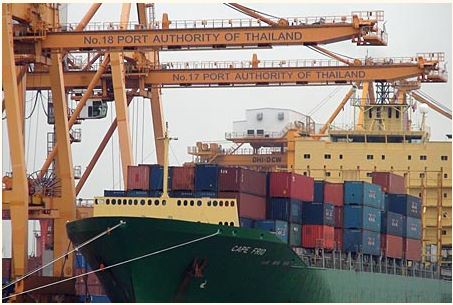Tidal Wave of Foreign Trash Hits Thailand

Searching the housands of containers at Thai ports for illegal waste shipments is a monumental task. While there has been shipping along the Chao Phraya River for centuries, construction of Bangkok Port was started in 1938. Construction of Laem Chabang Port on Thailand’s Eastern Seaboard, now much larger than Bangkok Port, was begun in 1987. (Photo by Guido Vanhaleweyk) Posted for media use.
By Sunny Lewis
BANGKOK, Thailand, August 9, 2018 (Maximpact.com News) – Government officials in Thailand are struggling to limit a waste scandal after discovering a massive amount of plastic and electronic waste was imported to the Southeast Asian country this year, often illegally, by factories involved in recycling.
Thais have been shocked to learn that hundreds of thousands of tons of electronic waste has been shipped into the country since China decided to stop taking waste from wealthy countries at the end of 2017.
The waste scandal became public in late May after Thai police raided a waste management plant in Chachoengsao, east of Bangkok, after claims that hazardous waste smuggled from abroad was being burned at the facility.
Media reports show that untrained and unregistered migrant workers paid just 9,000 baht a month (US$272) were handling toxic items and burning electronic circuit boards, exposing themselves and the environment to heavy-metal contamination.
The Chinese owner of the plant was accused of importing potentially dangerous waste under false Customs declarations, the U.S. publication “The Nation” reported in a June 11 article. Foreigners were smuggling trash and declaring it as second-hand goods, police said.
The revelation led to other illegal waste sites being raided. Officials admitted they often had “no idea what kind of waste is toxic” or how to deal with it.
More than 210,000 metric tons of waste was found to have been imported from 35 countries in the first five months of this year, Thai police said.
Fears that Thailand – or “Trashland” as some cynics have labeled it – could become the new dumping ground for the world’s electronic waste. That spurred concern about the long-term toxic hazards from waste piled up at e-waste dumps.
The world is generating more e-waste than ever. Frost & Sullivan’s recent analysis, “Global Waste Recycling Market Outlook, 2018,” reveals that close to 48.2 million tonnes of eWaste was generated in 2017, of which only 20 to 25 percent was documented to be collected and recycled. The remaining waste was either landfilled or disposed of unsafely or illegally in countries like Thailand.
This scenario is likely to persist in the absence of stringent regulations, closed-loop supply chains, and greater producer responsibility. China made a market-altering decision when it announced a ban on the import of 24 categories of recyclables and solid waste by the end of 2017.
This decision will force the world’s biggest waste importers, which include the UK, the US, Europe, and Japan, to build new recycling infrastructure in their own facilities or look to other Southeast Asian countries for waste management.
On June 1, four containers packed with plastic waste were found in eastern Bangkok. By the third week of June, nearly 20 illegal waste sites had been raided and there was speculation that legal changes brought in by the military government had opened the door to the “surge in foreign trash,” because such facilities could now be set up anywhere regardless of an area’s zoning.
A representative from Greenpeace said, “Electronic waste (e-waste) can be used as fuel in waste incinerators, as well as unrecyclable plastic. This order has eased restrictions for incinerators and waste factories.”
The NGO ReReef Thailand, which wants to build a business case for sustainability based on the vulnerabilities of the country’s coral reefs, said, “The substance never disappears … Since the beginning of plastic production, about 60 years ago, 6.3 billion tons of plastic never really gone. Less than 10 percent of recycled materials mean that more than five billion tons of plastic has become waste in the environment. It has become one of the most important environmental crises of this era.”
Concerned about the scale of the problem, and media reports that perhaps that national politicians had been involved in the illegal trade in waste, Deputy Prime Minister Prawit Wongsuwan said there may no longer be imports of foreign waste to Thailand.
The licenses of five importers were suspended after they were found to have hired illegal factories to recycle waste.
Interior Minister Anupong Paochinda said the government will establish a multi-agency panel to work out how to regulate garbage from other countries. “It’s not just e-waste but also other types of garbage,” he said. “If the trash does not benefit the country and causes negative impact and burdens, we won’t allow it to be imported.”
Meanwhile, about 400 containers thought to contain electronic waste, plastic and discarded metal are now sitting abandoned at ports in Bangkok and Laem Chabang. Customs officials have warned that if they are not claimed within 15 days, they will dispose of these containers and their contents or send them back to where they came from – countries such as the United States, Japan, Singapore, Hong Kong and China.
All of this disruption has triggered a warning from a U.S. environmental group that the experience Thailand has gone through could happen to many countries in South and Southeast Asia.
Basel Ban Amendment Close to Becoming Law
The Seattle-based NGO Basel Action Network said Monday that developing countries could be “hit by a tidal wave of electronic and plastic waste” if they don’t move to ban the import of such waste by ratifying an international agreement called the Basel Ban Amendment.
This change to the Basel Convention, an existing treaty agreed by 194 countries, would make it illegal to export hazardous and electronic waste from developed countries such as those in the European Union to poorer states.
The Basel Action Network says most e-waste from North America and Europe is exported to Asia – to Hong Kong, and increasingly to Thailand and Pakistan.
“Brunei, China, Indonesia, Malaysia and Sri Lanka have ratified the agreement, but Bangladesh, Cambodia, India, Laos, Myanmar, Pakistan, Philippines, Thailand and Vietnam have not,” said the Basel Action Network in a statement.
“It is especially ironic that while the Thai government is rightly very concerned about the dumping on their territory, they have not made a move as yet to ratify the Ban Amendment. The Ban Amendment is but three ratifications short of going into the force of international law.”
New Technology Could Relieve Waste Burden
“The waste recycling market, like its end-user industries, is experiencing disruptive changes due to the advent of advanced digital technologies,” said Deepthi Kumar Sugumar, Frost & Sullivan research analyst. For example, smart waste bins with Internet of Things (IoT) capabilities will play a significant role in changing the way waste is collected and sorted.”
Using an ultrasonic sensor, an Internet of Things system gives a real time indicator of the garbage level in any trash can at any given moment. Using that data garbage companies can then optimize waste collection routes to reduce fuel consumption.
“Similarly, the rise of 3D printing technologies has made it much easier to recycle plastic waste. Many industries are turning plastics into high-quality filaments to replace spares, lowering the need for re-manufacturing,” said Sugumar.
Although technology has improved waste management considerably, market participants using these technologies will be challenged to convince industries employing conventional methods to switch to modern systems. They need to be made aware of the role novel recycling systems can play in enabling a circular economy, said Sugumar.
Meanwhile, the use of cutting-edge technologies is giving rise to innovative business models such as commercial waste collection zones. These models allow haulers to invest in infrastructure improvement and introduce inventive methods for minicipal solid waste collection.
By optimizing waste collection routes, combining real-time data, and employing data-related technologies such as predictive analytics, it will be possible to eliminate the unplanned dispatch of vehicles to collect waste.
“Another important technology that could have far-reaching consequences for the waste management market is augmented reality (AR),” observed Sugumar. “AR can help any manufacturer make informed decisions to prevent waste in the first place. Though AR is still evolving, it will change the way waste reduction and management is conducted in the future.”
Featured Images: Trash at the Nonthaburi landfill, Bangkok, Thailand, February 4, 2014 (Photo by Thibaud Saintin) Creative Commons license via Flickr
